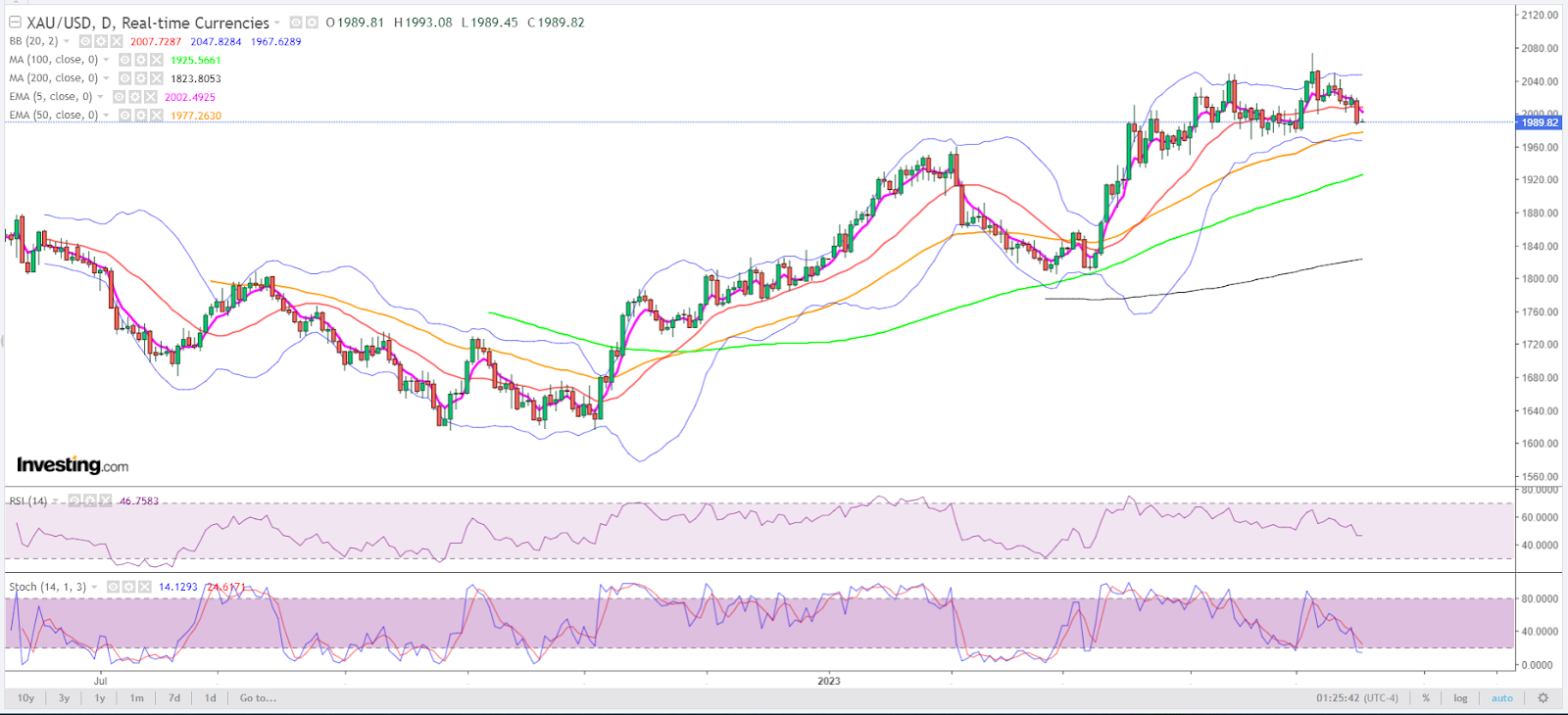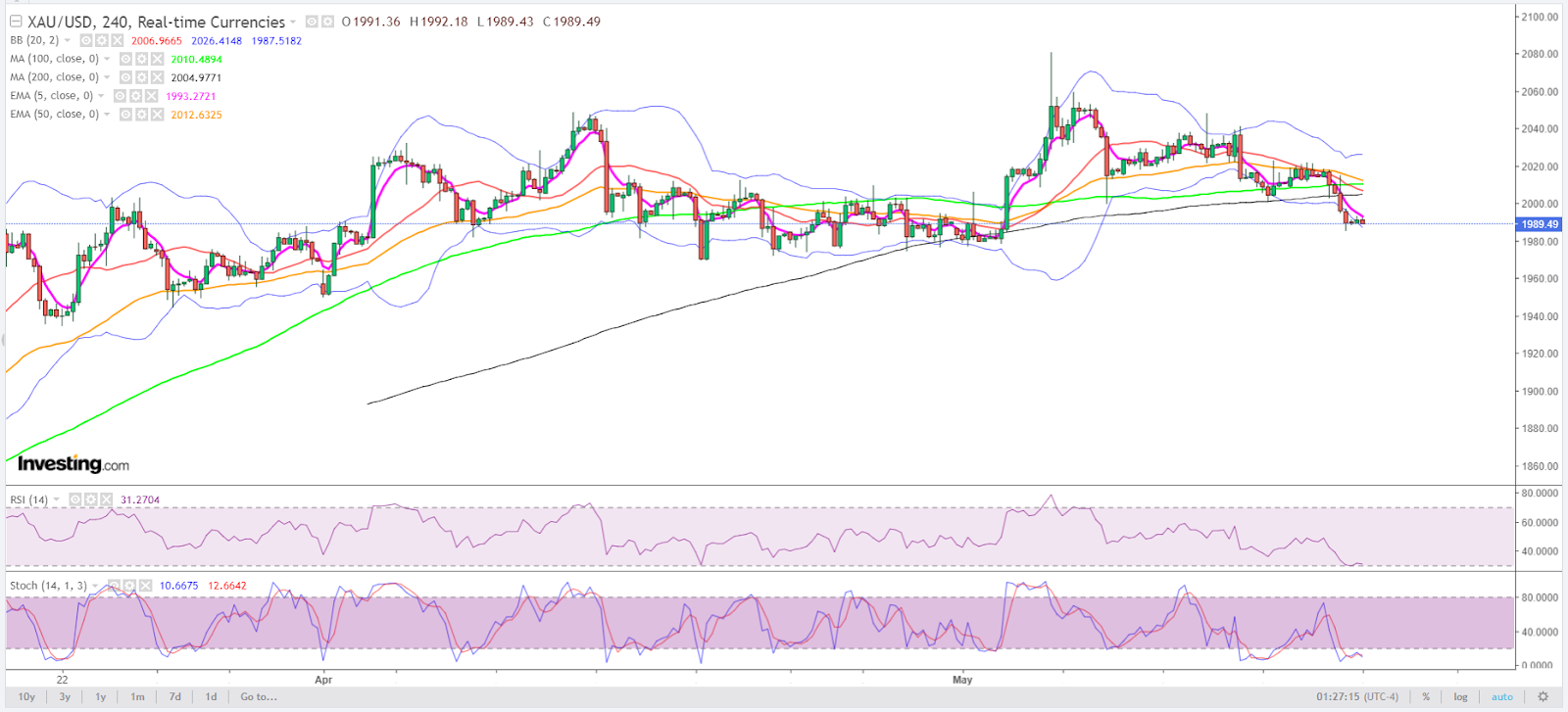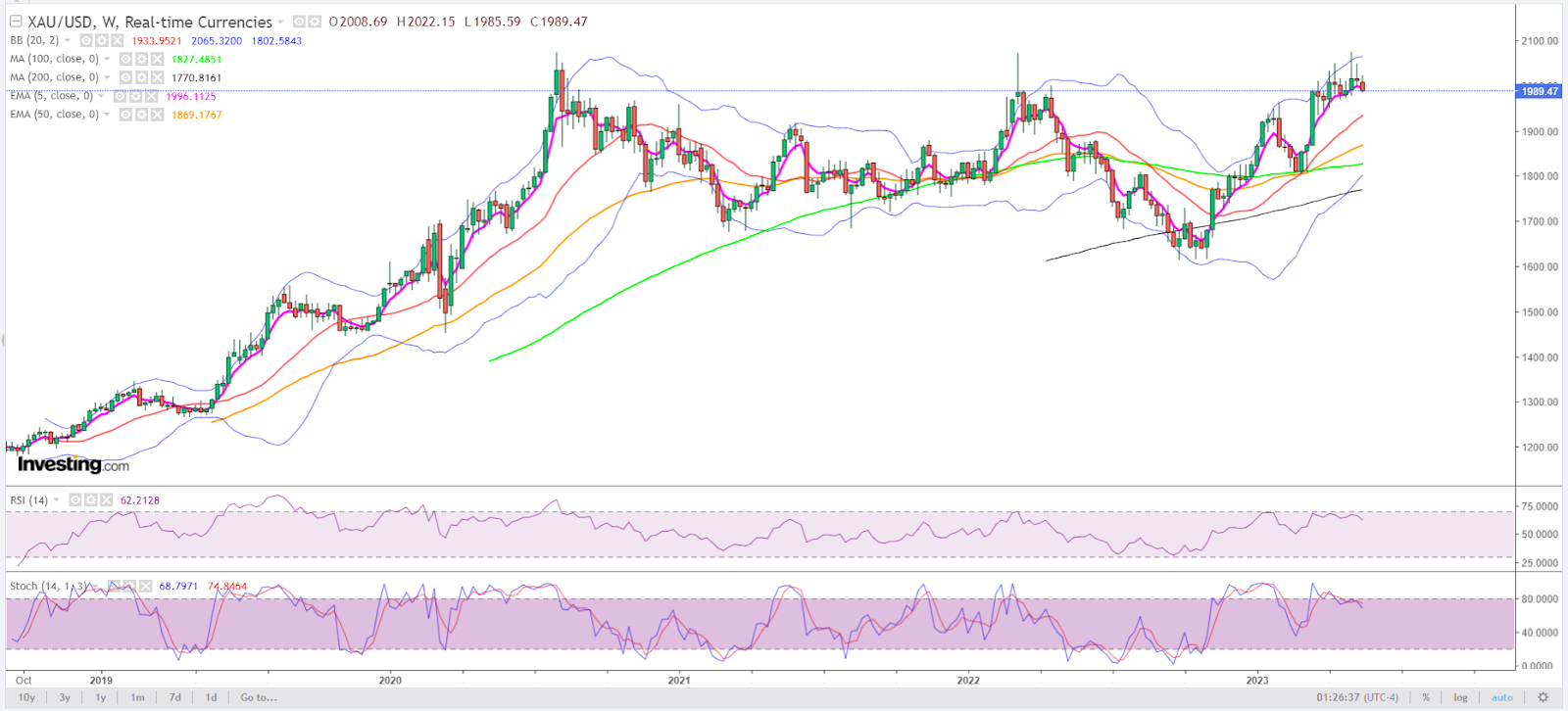Gold: After Mini-Crash to Below $2,000, What’s the Chance for Upside?
2023.05.17 04:29
- Gold’s closing streak above $2,000 short-circuited by dollar, Treasuries
- But a study of trading charts show gold’s upside probably chipped, not broken
- Spot gold should not close below $1,975 on a weekly basis to reclaim momentum
Two weeks: That’s how long gold’s closing streak at above $2,000 an ounce lasted before bulls in the space got shoved off the perch Tuesday.
But the mini-crash in the yellow metal — that’s what some are calling it given that the loss on the day was just under $30, or 1.5% — means the upside isn’t broken, but probably just chipped.
Hailed as a hedge against economic and political troubles, gold settled below $2,000 for the first time since May 1, and after the May 5 rally to record highs.

Charts by SKCharting.com, with data powered by Investing.com
The tumble came as more investors rotated into the dollar and U.S. Treasuries. The switch came after steady economic data for April suggested the American economy, like gold, wasn’t shattered — but just shaken from a number of banking failures, weak first quarter and stubbornly-high .
The steadied above 102 and the yield on the hit a two-week high of 3.572% as markets wavered between the possibility of a deal and impasse in talks to raise the debt ceiling held by the White House with its Republican rivals in Congress. Of course, as we know now, the negotiations got nowhere.
Yields of certain U.S. Treasury bills could rise to 10% if the deadlock over the debt ceiling extends through the maturity of the securities, Jerome Schneider, head of short-term portfolio management and funding at bond manager PIMCO, warned.
That could only mean one thing: More bond-chasing funds that will likely dump gold.
While a breakthrough hasn’t happened yet in Washington’s debt-ceiling standoff, there is also increasing chatter about what could go into a bipartisan deal that ends the stalemate and avoids a market-shaking default.
Said Ed Moya, analyst at online trading platform OANDA:
“Gold is lower as Wall Street awaits a meaningful update with debt ceiling talks. Wall Street is bracing for something bad to happen. But no one has an idea on what will be that catalyst. It could be a debt ceiling impasse, persistent banking fears, or a much weaker consumer as sticky inflation becomes more noticeable.”
Moya said the dollar was being kept up, meanwhile, by optimism that the U.S. economy could still be saved from a hard recession. He adds:
“The ‘soft-landing’ hopes are still hanging onto a thread and that is keeping some investors from going aggressive into safe-havens. Too many risks remain on the table for investors to go offensive. Risk aversion could get a boost from regional banking fears, debt ceiling drama, and a weakening consumer, but it will likely come from a new catalyst.”
Where to From Here?
on Comex hit an all-time high of $2,085.40 on May 4. The benchmark gold futures contract settled Tuesday’s trading in New York at $1,993 an ounce, down $29.70, or 1.5%, on the day, after a session low at $1,989.25. In Asian trading on Wednesday, June gold hovered at just above $1,992.
The , which reflects physical trades in bullion and is more closely followed than futures by some traders, hit a record high of $2,073.29 on May 5, according to Investing.com data. On Tuesday, spot gold settled at $1,988.60, down $29.81, or 1.8%, on the day. In the latest session, it hovered under $1,989 in Asian trading.
Some gold buyers said they bailed out even earlier, after the yellow metal’s inability to progress to the key $2,040 an ounce mark following its consolidation from record highs.
Phillip Streible, chief market strategist at Blue Line Futures and an investor in gold, told Investing.com:
“I never really got too heavily invested in gold as it never really reestablished the breakout at $2,036 that could make a fresh run for the highs. I trimmed off a lot of gold at that point. The recent U.S. data is not really that bad either, suggesting a soft landing is still possible.”
“Be that as it may, some officials say they’re not really sure where we are getting to with the economy, and we could have another rate hike come June. For sure, more rate hikes aren’t good for gold.”
Despite those with wavering convictions, a study of trading charts suggests that the upside which took spot gold to record highs two weeks ago, isn’t over yet, said Sunil Kumar Dixit, chief technical strategist at SKCharting.com. He adds:
“The current $100 drop from $2,081 to $1,985 and some further correction does not confirm that primary uptrend is broken. It is more of an usual correction from a record high situation, triggered by a bounce in the dollar.”

It was also more of a “momentum distribution”, with the $2,018 level becoming a resistance now for gold, he said.
As long as prices sustain below the 23.6% Fibonacci level of $2018, a drop to the 38.2% Fibonacci level of $1,975 appears to be a high probability, said Dixit.
“I don’t see any major violation of the primary uptrend so long as the metal stays above $1,975 on a weekly closing basis.”

He also said if the dollar index did not drop below 102, it could go above 102.70 and extend that momentum towards 103.40, complicating gold’s return to $2,000.
Dixit warned that a weekly close beneath $1,975 will extend gold’s downside to the horizontal support zone of $1,968-$1,955 and the 50% Fibonacci level of $1,942.
The $1,940 levels could be a turning point for gold, bringing bargain-hunters back to the metal, he said, adding,
“This zone can attract value buying and the uptrend from that can power gold all the way back up towards $2,018.”
 Be the First to Know With InvestingPro
Be the First to Know With InvestingPro
***
Disclaimer: The content of this article is purely to educate and inform and does not in any way represent an inducement or recommendation to buy or sell any commodity or its related securities. The author Barani Krishnan does not hold a position in the commodities and securities he writes about. He typically uses a range of views outside his own to bring diversity to his analysis of any market. For neutrality, he sometimes presents contrarian views and market variables.







